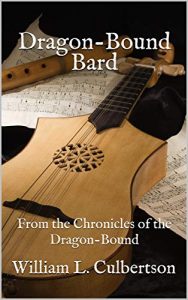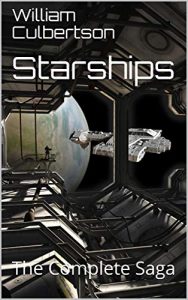William Culbertson | Author Interview
One of the best things about editing is that I get to read some really inspiring works. I want to share some of the amazing people I have had a chance to collaborate with.
I have always enjoyed various genres, so you never know who I will be featuring here!
This month, I have William Culbertson. He published Dragon-Bound Bard a few weeks ago. I instantly fell in love with the world of the dragon-bound. Culbertson is quite the story teller.
So let’s dive into the mind of Professor Culbertson!
Who are you?
 I am a retired teacher. For the last thirty years, I taught mathematics at a local community college. For a dozen years before that, I taught junior high. Many teachers say junior high is a difficult age, but I enjoyed the students’ youthful enthusiasm. Perhaps it was a sign of my own arrested development?
I am a retired teacher. For the last thirty years, I taught mathematics at a local community college. For a dozen years before that, I taught junior high. Many teachers say junior high is a difficult age, but I enjoyed the students’ youthful enthusiasm. Perhaps it was a sign of my own arrested development?
My wife and I currently live in a small town in northwestern Ohio. Our dog Bindle, a Labrador retriever, is named after one of my favorite characters from my books.
When I first got into education, as an educator on a sailboat, I loved middle school kids. They are still young enough to show their excitement, but they are starting to come into their full adult personas. (Also, dog lovers unite!)
How did you know you wanted to be an author?
I was infected with the urge to write very early. In seventh grade I discovered science fiction and fantasy. Always a voracious reader, the idea of creating my own stories came to me about the same time. I started any number of tales, and even finished a couple. However, the idea of actually being an author seemed more an idle fancy.
It was graduate school that finally corrupted me. First of all, I proved to myself that I really could produce a book (a monument of tedious academic prose). Most importantly, on the long nighttime drives I listened to playlists of loud, heroic movie themes to stay awake. The music inspired me to conjure stirring scenes of daring do and intrepid glory. Replaying the episodes in my imagination, I realized that a few of them linked together to tell a longer story. More pieces began to fall into place, and I knew I had to write the story.
What is most important for your writing routine?
Having several projects seems to work well for me. I usually have one new draft going while several others are in various stages of editing and revision. While some writers outline in detail from start to finish where they are going, I start with a character or two that I put into a situation that compels them to take action. Although I’ve got a pretty good idea where I want them to end up and some of the major plot points along the way, I let the story and the characters develop as I go. Yes, the “seat of your pants” method.
Since my plots grow organically, they sometimes bog down. Instead of forcing something onto the page before it’s ready, I switch over to another project to edit or revise. While dealing with that, the original plot continues to develop (compost?) in the back of my mind. I get impatient to get back to the unfinished story. Picking up where I left off, I’ve got a better feeling for what happens next, making it much easier to write.
What do you think is important in shaping characters?
One thing I love about the writing process is getting to know the characters. While I may think I know my characters at the start, as I write about them interacting with others and facing challenges within themselves, I discover amazing new things about them. Yes, young Dax the exiled king wants to get his kingdom back, but how will he react when a pretty girl flirts with him? Chaif Tabor has to escape from the pit of despair, but what decisions does he make and what will it cost him along the way? I love discovering the true depth of the characters I create.
I love this philosophy a lot. Your process seems to make a lot of sense, but it’s not one you hear about much.
How did you make such a kickass female lead?
In the media culture of my youth, including fantasy and science fiction, misogyny was deeply ingrained. Females in peril cowered and screamed while the male hero saved them. However, that’s not how the women I knew interacted with the world. Now that I’m aware of this stereotype, many old movies are almost unwatchable. While my female characters are products of the culture in which they live, they have ambitions and desires of their own. If one of my main characters gets bullied into submission, whether male or female, you can bet that he or she will eventually have satisfaction.
 The character Tarissa Lathetta first appeared in my book Dragon-Bound Thief as a minor character. An experienced member of the dragon-bound, Tarissa helps the main characters. While consoling Symiss, Tarissa reveals facts from her own past that intrigued me the more I thought about them. Before long, I knew I had to tell Tarissa’s backstory. Not only was it a good story about a young woman finding out who she was, the story filled in details about the kingdom of Landly. Dragon-Bound Bard is the sixth story in this fantasy realm.
The character Tarissa Lathetta first appeared in my book Dragon-Bound Thief as a minor character. An experienced member of the dragon-bound, Tarissa helps the main characters. While consoling Symiss, Tarissa reveals facts from her own past that intrigued me the more I thought about them. Before long, I knew I had to tell Tarissa’s backstory. Not only was it a good story about a young woman finding out who she was, the story filled in details about the kingdom of Landly. Dragon-Bound Bard is the sixth story in this fantasy realm.
So are there more stories of the dragon-bound that need telling? For the moment I’m off on another project in another world, but dragons are never too far from my mind.
EEE! I have to say, I hope there are more. I love this world and can’t wait to catch up on all of the other stories while I (not so) patiently wait for the next installment.
What do you look for in a good book?
For recreational reading, a book has to have good characters, a dynamic plot, and clear writing. I apply those standards to non-fiction as well. While I will wade through quite a bit of turgid prose for a good cause, I get impatient when an author makes choices that smother the clarity of what they are saying.
Interestingly, now that I’m writing fantasy and science fiction pretty much full time, I find myself more drawn to reading mysteries and thrillers. I used to read to visit fantasy worlds for escapist pleasure, but now I’m escaping back to reality?
Ha! That makes sense. When I edit a whole string of romance, I dive into fantasy worlds. But when I’ve been working on sci-fi or fantasy, I have a hard time immersing myself into another world.
What are your favorite examples of strong characters in literature?
Sherlock Holmes immediately comes to mind. Holmes is always a step or two ahead of everyone else, including the reader. I have read beyond Doyle’s canon of stories about Holmes, but other authors usually disappointed me in the way they treated this character. One notable exception is the recent BBC series Sherlock. The first three (but not the fourth) seasons do a nice job of bringing this character into the modern world.
I’m also drawn to characters like Tolkien’s Frodo Baggins and Defoe’s Robinson Crusoe. These are ordinary people who find themselves in difficult, dangerous situations. Forced to confront peril, they find the courage and capacity within themselves to triumph.
Do you have any advice for would-be authors?
Write. This is obvious, but the more you practice writing, the easier it becomes and the better at it you get. Directed writing done for a class or a business report counts, but it won’t scratch that creative itch writers have. Many authors keep a daily journal. While no historian will ever gain insight from the pages of my life, the daily practice of organizing and putting my thoughts into words helps me write books.
Read. Sure, I took the required English classes, but I didn’t enjoy them. I preferred math and physics. However, I’ve been a reader all my life. I read so much as a kid that my nose was in a book every time my parents took me anywhere. When I got my own license to drive, I had to ask directions on which route to take to the next town. Behind the wheel, I saw the countryside for the first time.
How did reading help me write? Even though I didn’t study English, I was immersed in the sound and flow of words. I have a good vocabulary, but more importantly I have a feel for the distinct shades of meaning words have. I’m familiar with a variety of ways to express the same thought. Because I read, I can write.
Where can we learn more about you and keep track of any new releases?
- My web site, where I put occasional thoughts and updates
- On Wattpad I have samples of my writing
- My author account on Facebook
- I comment on Quora from time to time
Did I forget anything that you really want to say?
I have another new release titled Starships: The Complete Saga. For this science fiction title, I’m doing something new by working with a local artist to create an illustration for each of the five interrelated stories.
That’s just amazing! I love artist-author collaborations.
Here’s the promotional blurb:
Humans reach for the stars in mighty, fusion-powered ships. Each craft is controlled by an intelligent entity and is capable of carrying a whole colony to a new world. Set in the far future, this work of classic science fiction chronicles a decidedly human undertaking.
 Dawn: Chessa Valentine, leading research to develop the control system for the first starship, discovers evidence of a chilling murder. But is it really murder? Whatever the crime, the implications threaten Chessa’s life as well as the whole Project Starship.
Dawn: Chessa Valentine, leading research to develop the control system for the first starship, discovers evidence of a chilling murder. But is it really murder? Whatever the crime, the implications threaten Chessa’s life as well as the whole Project Starship.
Unbound: Captain Tak Meller commands the starship Odysseus on a mission to deliver an unprepared group of colonists to a marginally habitable world. Troubled by the ethical implications of this task, Meller’s job is further complicated by his attraction to the daughter of the leader of the religious zealots who are his passengers.
Resurrection: Penn is sent to stand honor watch aboard the Artemis. The former starship had journeyed to the stars but now orbits Earth, a symbol of mankind’s retreat. While on duty, Penn gets new orders: The Artemis is to be scrapped. This melancholy milestone is cancelled by an unexpected objection.
Free Mars: Dr. Tate Richardson’s trip to the Moon for a mathematics conference is interrupted by raiders from the Republic of Mars. Kidnapped to Mars, Tate’s unappreciated talents prove the key to his abductors’ own starship project.
Song in the Dark: Griffen Kees, captain of the starship Prometheus, is relieved of his command just as the ship is given the most exciting mission in history—first contact with an alien civilization. Assigned to a bureaucratic underworld, Captain Kees’s initiative forges a new destiny for himself—and mankind.
Well, I’m off to add some more items to my Christmas list… Thanks for giving us a peek into your world!

Leave a Reply